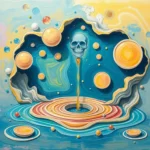
Introduction
Dreams have long fascinated humanity, serving as windows into our subconscious thoughts and emotions. Among the myriad of dream symbols, encountering a dead body can evoke a range of feelings—from fear and confusion to contemplation and introspection. This particular dream symbol intrigues many due to its profound implications. It often prompts individuals to explore their emotions about death, loss, and transformation. Understanding the significance of a dead body in dreams can illuminate aspects of our waking lives, offering insights into our inner worlds and helping us navigate our experiences with grief, change, and personal growth.
Symbolism and Meaning
The appearance of a dead body in dreams can be laden with various meanings, often dictated by the dreamer’s personal context, cultural background, and emotional landscape. One of the most prominent interpretations revolves around the concept of transformation. In many cultures, death symbolizes the end of one phase and the beginning of another. Thus, dreaming of a dead body may signify that a particular aspect of your life is concluding, paving the way for new beginnings. This perspective invites dreamers to consider what is coming to an end in their lives—be it a relationship, a job, or even a belief system.
Another layer of meaning can be found in the emotional response elicited by the dream. If the dream evokes feelings of fear or anxiety, it might indicate unresolved issues or fears related to loss. Such dreams can serve as a manifestation of the dreamer’s worries about mortality or the changing dynamics in their life. Conversely, if the dream is approached with a sense of peace or acceptance, it could suggest that the dreamer is coming to terms with a difficult situation or is ready to let go of the past.
Moreover, the identity of the deceased can play a critical role in interpreting the dream. If the dead body belongs to someone close to the dreamer, it may represent the dreamer’s feelings about that person or their relationship. It can serve as a reminder of shared memories, unresolved conflicts, or the impact that person had on the dreamer’s life. In contrast, if the body is unknown or abstract, it may symbolize a more generalized fear of change or the unknown.
Key Scenarios and Variations
The context in which the dead body appears can greatly influence its interpretation. For instance, dreaming of a dead body in a familiar setting—like one’s home—might suggest that the dreamer is confronting feelings of safety being threatened or altered. It may reflect a deep-seated fear of change that disrupts their sense of security.
In contrast, if the dead body is discovered in an unfamiliar or public space, it may indicate feelings of vulnerability or exposure. Such dreams could highlight anxieties about being judged or scrutinized by others, especially if the dreamer is undergoing significant life changes.
Another variation involves the action taken with the dead body. For example, if the dreamer is burying the body, it may signify a desire to put something to rest or to find closure regarding a past experience. On the other hand, if the body is being left unattended, it might indicate avoidance or denial about a situation that requires attention.
Dreams featuring multiple dead bodies can carry weighty implications as well. They may symbolize overwhelming feelings or issues that need to be addressed. For instance, a dreamer who experiences the loss of multiple loved ones in a dream might be processing their grief or feelings of abandonment, reflecting larger themes of loss in their life.
Additionally, dreams where the dead body comes back to life can signify hope and rebirth. This scenario often represents personal transformation, suggesting that even after endings, there is potential for new beginnings. It encourages dreamers to embrace change and find ways to rejuvenate aspects of their lives that may feel stagnant.
Real-Life Connections and Takeaways
Interpreting dreams about dead bodies encourages self-reflection and introspection. To truly understand what these dreams mean for you, consider the emotions and scenarios that play out in them. Reflect on your current life situation—are there areas where you feel a sense of loss, change, or transformation? Are there relationships or aspects of your life that you are struggling to let go of?
Taking time to journal about these dreams can be particularly beneficial. Write down the details of the dream, your emotional responses, and any connections to your waking life. This practice can help you uncover hidden feelings or unresolved issues that may need attention.
Furthermore, it can be helpful to engage in conversations with trusted friends or family members about your dreams. Sharing your thoughts and feelings may provide new perspectives and insights. They might help you see connections or patterns that you hadn’t considered, offering a support system as you navigate your emotions.
Additionally, consider the importance of self-care during times of significant change or transition. Engaging in activities that foster emotional well-being—such as meditation, exercise, or creative expression—can help ground you in the present and ease feelings of anxiety or grief.
Ultimately, dreams of dead bodies can serve as powerful reminders of the cycles of life and the importance of processing emotions. They invite you to confront your feelings about change, loss, and what it means to let go. By reflecting on these dreams, you can gain a deeper understanding of yourself and find ways to embrace the transitions that life presents.
In conclusion, the symbolism of a dead body in dreams encompasses a wide array of meanings, often reflecting personal transformations, unresolved issues, and emotional processing. By examining the context and emotions surrounding these dreams, individuals can glean valuable insights into their waking lives. Whether you are grappling with feelings of loss, facing significant changes, or seeking closure, these dreams can ultimately serve as catalysts for growth, urging you to navigate your journey with awareness and intention.







